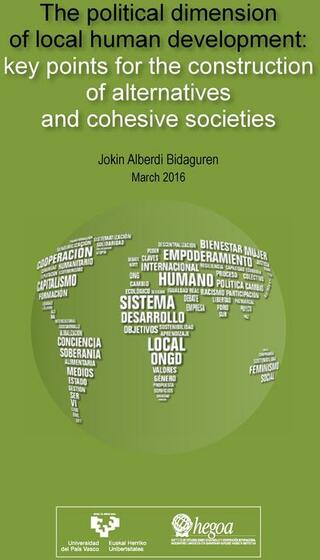
The political dimension of local human development: Key points for the construction of alternatives and cohesive societies
- 1130
- 153

This study aims to look in depth at the political dimension of the theoretical and analytical framework of Local Human Development (LHD) that Hegoa has been working on in recent years. It examines new analytical ideas, categories and tools that might be useful in order to understand the workings of societies that act as political units, and which can be employed when facing the challenges of the current context of profound change. The aim, then, is to emphasise the group’s capability for decisionmaking with regard to the future.
In short, the aim of this study is to examine the conditioning factors or socio-political framework of LHD, and to offer areas of study, guidelines and analytical tools that facilitate the understanding of socio-political structures and their dynamics in the taking of decisions that affect a certain group and are important when it comes to determining that group’s future (Dubois, 2013: 95). The goal is not to define how objectives and change processes should be, but rather to catch a glimpse of the way in which transformational processes must be considered in the different territorial/ local contexts. The goal is to offer possibilities so that a territory’s actors can have the political capabilities for transformation.
With this intention, the study has been divided into two major blocks. In the first, past and present forms of dealing with the matters of power, democracy, participation and governance in international cooperation and development studies will be looked at, selecting some of the most interesting contributions of the human capability approach and others from political and sociological theory that can contribute to this task of scrutinizing territories’ transformation strategies.
I. Introduction
II. Democracy, participation and governance in relation to development.
1. Hegemonic and alternative views of development’s political dimension.
2. Thought about democracy and participation in development studies.
3. Democratic participation and empowerment in community projects.
4. Democracy as a condition for development and the new debates.
III. Democracy, participation and human development.
1. Amartya Sen’s three values of democracy.
2. Boosting the most excluded sectors’ deliberative capabilities and relational democracy.
3. Political participation and the capability approach
IV. Governance and the new institutionality in territories’ transformation strategies.
1. Participation and public-private interaction.
2. Keys points with respect to interaction among State, market and society.
3. New conception of the territory and relations between the global and the local.
V. Political concepts and categories for revising the collective capability approach.
1. The complexity of relations of power and its spheres.
2. Affiliation, participation and collective capabilities.
3. Resilience and institutional innovation.
VI. Proposals for measuring LHD’s political dimension.
1. Politics and development: what to measure, how to measure, why measure it and for whom.
2. How to establish indicators for LHD’s political dimension.
3. As an epilogue.
VII. Bibliography